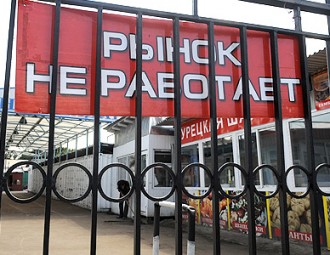Siarhei Balykin: Belarusan business and civil activity are incompatible now

Individual entrepreneurs at markets and markets themselves, but for grocery ones, are doomed to go without any protests, believes the chair of the Association for Small and Medium Entrepreneurship.
Over the last years it have been the individual entrepreneurs with their strikes and delegations to the officials who were the main newsmakers in the streets; at least in comparison with the demonstrations of political opposition that gather insignificantly small number of participants. However, the activity of individual entrepreneurs usually disappears immediately after their acquirement of some ease for working or delay of introduction of new trade rules. Is the transformation of active part of individual entrepreneurs’ community into civil society activists possible in the future? What is the small Belarusan business to expect in future? Siarhei Balykin, the chair of the Association for Small and Medium Entrepreneurship, discusses these issues in the interview with the EuroBelarus Information Service.
“We should note that the opinion about market traders is wrong, - says Balykin. – If we look back to the history of small business in our country, the forms were different – organizations, cooperatives, small enterprises, and economic societies. A lot of them appeared in 1989-1990; so the business in our country started not from markets – markets were started in the 90s by poor people who were dismissed from work, after the USSR collapsed and people had nowhere to go to. Initially, the biggest number of individual entrepreneurs was in construction and catering”.
Well, the expert notes that the opinion about business as the most active part of population has grounds – but not in our country: “If we consider western society it is more active by itself for various reasons, including historical development. Thus, for example, voluntarism is well-developed in different forms: from collecting signatures for candidates to saving homeless animals, whereas in western countries business has always been the motive power of changes. If we consider the number of politically or socially active entrepreneurs in each sector of economy, obviously, the percentage of such people is not bigger than in the whole society in general”.
The leaders of entrepreneurs’ movement, notes Balykin, are rather disunited than are working for some common goal. Among the latter one can meet both “town “God’s fools”, great experts, people dissatisfied with their situation, and obvious scoundrels that only care about funding”. “In fact, people that take social activity as their responsibility are very few in business”, - Balykin is convinced.
“As to the demonstrations, their number is constantly decreasing; so it isn’t worth expecting that something will develop from numerous individual entrepreneurs at markets. There are several reasons for that, including ageing: typical individual entrepreneurs at markets have grown old over the last 20 years, while new generation doesn’t go to work to markets. Thus, individual entrepreneurs will hardly go to some Ploshcha – they just want to live to get some pension,” – claims Siarhei Balykin.
Markets themselves, but for grocery ones, are losing their popularity:
“Entrepreneurs will go from markets. The more liberalized economy gets the less chances they have. Even now it is much more profitable and cheaper to buy from huge firms that have big turnover with smaller prices. It used to be profitable to sell contraband and infringing goods at markets, but after the rules were unified in the Customs Union individual entrepreneurs lost their interest”.
Siarhei Balykin sees one more argument, which, he believes, testifies to the complete absence of individual entrepreneurs’ interest in any social or political activity: “Now many individual entrepreneurs are suffocating on taxes, fees, confiscations, etc. As a lawyer, I see that many of these actions can be protested, but they don’t even try! Legal entities are trying to, but individual entrepreneurs don’t write complaints and don’t try to be at law with fiscal inspections and so on. There is no social activity in Belarusan business whatsoever!”
-
03.01
-
07.10
-
22.09
-
17.08
-
12.08
-
30.09



























